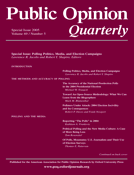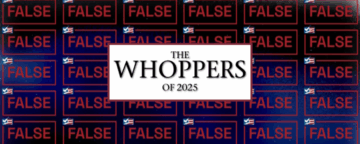Abstract:
During presidential elections, poll results frequently are presented in the news. Reporters use these polls to tell the public what it thinks about the presidential candidates. We argue that polling results tell the public what it should think about the presidential candidates as well. This study outlines how a character trait that is not usually used to assess presidential candidates was put into play during the 2004 presidential campaign. By repeatedly ascribing “stubbornness” to incumbent president George W. Bush, Democratic challenger John Kerry may have prompted this trait’s inclusion in a Los Angeles Times summer 2004 survey. The poll’s evidence that the public saw Bush as more stubborn than Kerry then produced an attribute agenda-setting effect that strengthened the link between that term and Bush. Using data from the National Annenberg Election Survey, we argue that the news coverage of this Los Angeles Times poll increased the salience of the trait “stubborn” in assessing President George W. Bush during June of the 2004 presidential campaign.



